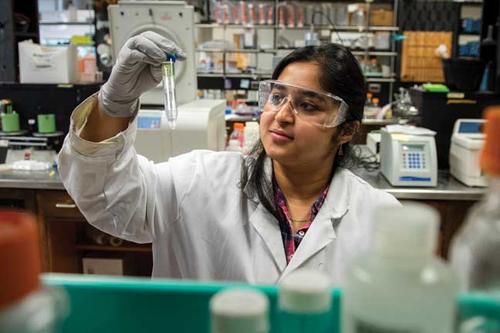Promising trends for U of M health science research reflect vision of improving Minnesota, global health

The University of Minnesota successfully competed for more than $1 billion in external research funding in fiscal year 2021, a first in the University’s 170-year history. That achievement was driven, in part, by broad-based interest, involvement and investment in health science research. During its meeting next Friday, the University of Minnesota Board of Regents will discuss what U of M health science researchers accomplished last year and what the future holds for this work at one of America’s leading research universities.
Dr. Jakub Tolar, dean of the U of M Medical School and vice president for clinical affairs, will outline for Regents the breadth of health science research at the University, an expansive scope that involves nearly all disciplines of the University and leverages the institution’s greatest strengths to drive superior results. Tolar will also outline his vision for the future to advance health care in partnership with the state, the nation and the global community to solve health challenges. As Tolar will note in his presentation, this vision aligns with several University commitments in its systemwide strategic plan, MPact 2025.
The University engages in almost all forms of health science research, from basic to translational, clinical to community-based. Under that broad umbrella, Tolar’s presentation will note that national trends in health science research have increasingly aligned well with the University’s more specific areas of expertise and interests, including: health disparities; underserved and rural populations; diversity, equity and inclusion; engaging communities on their health priorities; implementation and dissemination of basic science, and; digital health and big data, among others.
The unique intersections of these topics with University expertise have attracted increased funding for U of M health sciences research, as well as increases in high-impact discovery and scholarship.
The University’s health science research has a long and celebrated history of globally heralded advances, dating back to innovative medical devices like the pacemaker and procedures like open-heart surgery and live organ transplants. Discoveries and innovation during the COVID-19 pandemic, supported by strong research funding and awards, built upon this history. Funding for U of M researchers helped improve personal protective equipment, explore approaches to better predicting COVID-19 outbreaks, understand the biological systems of the virus and the body’s responses, expand knowledge of health disparities and impacts of the pandemic on various communities, and conduct in-depth trials of novel therapeutic and vaccine candidates.
U of M experts have also led on topics surrounding aging, quality of life, addiction, rural health, healthy equity and disease prevention and treatment, ranging from novel and rare diseases, to cancer and cardiac health.
As part of its October meetings, the Board is also expected to:
- Discuss emerging cybersecurity certification requirements with leadership from the Office of the Vice President for Research.
- Receive an update on the system strategic enrollment plan.
- Discuss key learnings from delivering classes during the COVID-19 pandemic, such as best practices for remote or hybrid instruction.
- Visit and tour the University’s Health Sciences Education Center, which officially opened in Fall 2020.
- Act on the President’s recommended six-year capital plan and 2022 state capital request.
- Discuss the University’s budget model in an overview provided by Vice President and Budget Director Julie Tonneson.
- Review the Twin Cities campus master plan.
- Receive an update on the Twin Cities campus dining program, including next steps in awarding a contract for dining operations in the coming years.
- Act on nominations to the University of Minnesota Foundation Board of Trustees.
- Receive an overview of the implementation plan for the Positioned for Excellence, Alignment and Knowledge (PEAK) Initiative, a systemwide effort to identify opportunities across non-academic functions to increase efficiency or gain capacity to advance the University’s teaching, research and outreach mission.
- Begin a series of discussions on diversity, equity and inclusion work on each of the University’s five campuses, beginning with a focus on the Twin Cities.
For more information, including future meeting times, visit regents.umn.edu.
- Categories:
- Campus Affairs
- Board of Regents





